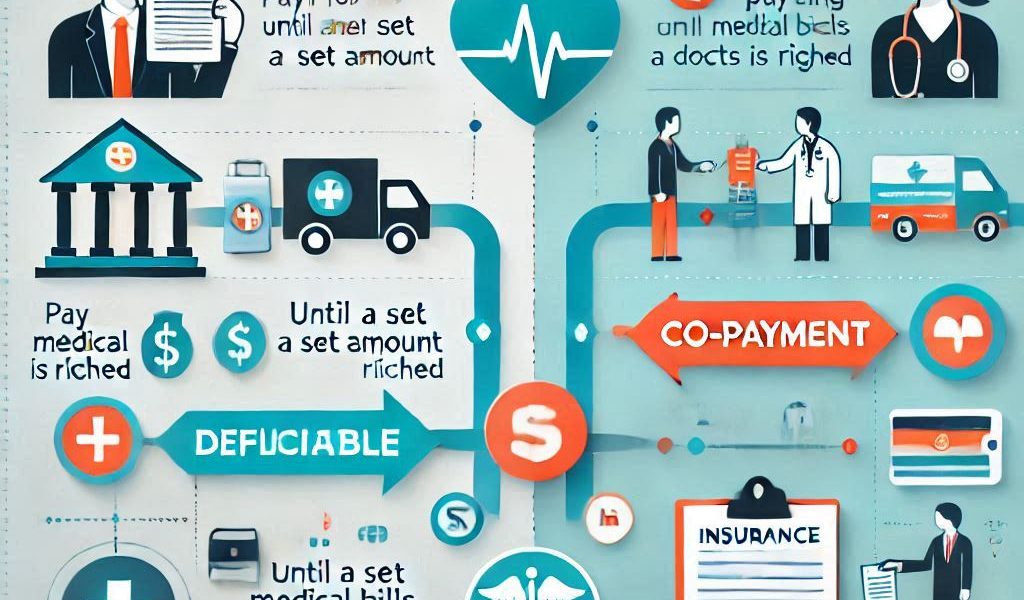When it comes to health insurance, understanding the financial terms like deductibles and co-payments is crucial. These are essential components that determine how much you pay out-of-pocket for healthcare services. In this blog post, we’ll break down what deductibles and co-payments are, how they work, and why they matter for your overall healthcare costs.
What Is a Deductible in Health Insurance?
A deductible is the amount of money you must pay out-of-pocket for healthcare services before your health insurance plan starts covering the costs. For example, if your health insurance plan has a deductible of $1,000, you must pay for the first $1,000 of your medical bills. Once you’ve paid your deductible, your insurance will start covering the costs of your healthcare services, though you may still be responsible for co-pays or coinsurance.
How Deductibles Work:
- Annual Deductible: Most health plans reset your deductible at the beginning of each policy year.
- Covered Services: Not all services apply toward your deductible. Make sure to check which services count and which don’t.
- Family vs. Individual Deductible: If you have a family health plan, there could be individual and family deductibles. The family deductible is often higher, but multiple people’s medical costs can count toward meeting the deductible.
What Is a Co-Payment in Health Insurance?
A co-payment (co-pay) is a fixed amount you pay for a covered healthcare service at the time of receiving it. This fee is typically much lower than the total cost of the service and varies depending on the type of healthcare service. For example, you might pay a $20 co-pay for a doctor’s visit or a $10 co-pay for prescription medication.
How Co-payments Work:
- Routine Care: Co-pays often apply to routine services like doctor visits, lab tests, or prescriptions.
- Different Co-pays for Different Services: A co-pay may differ depending on the service. For instance, an emergency room visit might have a higher co-pay than a regular doctor’s visit.
- Paid at the Time of Service: You usually pay your co-payment when you visit your healthcare provider or pharmacy.
How Do Deductibles and Co-Payments Affect Your Healthcare Costs?
Both deductibles and co-payments have a significant impact on your overall healthcare expenses. Here’s how they interact:
- Deductible First, Then Co-pays: You generally need to meet your deductible before your insurer starts paying a portion of your medical costs. Once your deductible is met, you’ll pay co-pays for services until your insurance covers most or all of the costs.
- Out-of-Pocket Maximum: Most health plans set a cap on how much you’ll have to pay out-of-pocket for covered services. This includes both deductibles and co-pays, so once you hit your out-of-pocket maximum, your insurance will pay for 100% of covered services.
- Balancing Deductibles and Co-pays: Health plans with lower deductibles often come with higher co-pays, and vice versa. When choosing a plan, it’s important to balance your healthcare needs with the costs you can afford.
Why Are Deductibles and Co-Payments Important?
Understanding how deductibles and co-payments work is essential for several reasons:
- Predict Your Healthcare Costs: Knowing your deductible and co-pay amounts helps you plan for upcoming medical expenses, making it easier to budget for healthcare.
- Choosing the Right Plan: If you are selecting a new health insurance plan, knowing the cost structure of deductibles and co-pays will help you choose a plan that fits your financial and healthcare needs.
- Maximize Coverage: By understanding these concepts, you can optimize your insurance benefits and reduce your overall healthcare costs.
Conclusion: A Key Part of Your Health Insurance Strategy
Deductibles and co-payments are integral to understanding your health insurance costs. They may seem like minor details, but they can significantly impact your finances. Knowing how they work can help you make more informed decisions about your health plan and manage your healthcare costs effectively. Always review your health insurance policy carefully to understand how these elements will affect you, and don’t hesitate to reach out to your insurer for clarification on any terms.




